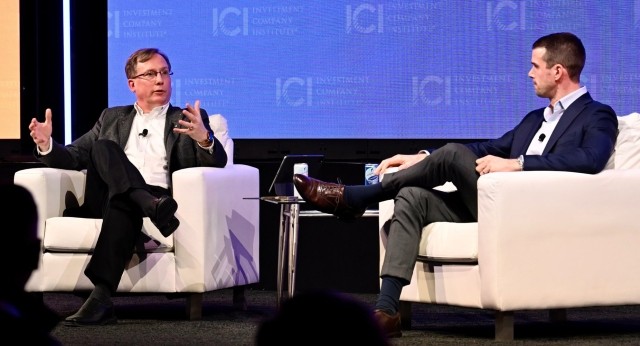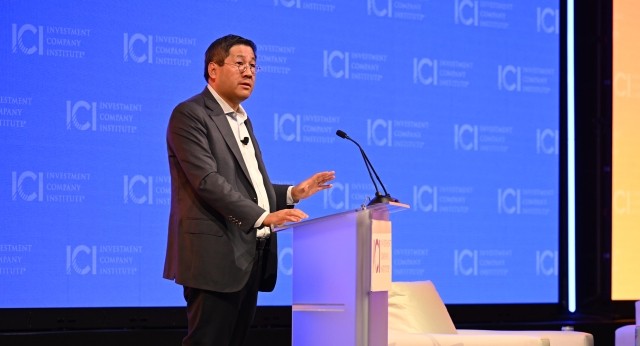
ICI Viewpoints
Top Takeaways from ICI Innovate
Despite the stormy weather in San Diego, the speakers and panelists at the first-ever ICI Innovate conference shined bright!
From February 6–8, ICI brought together the most creative and innovative industry minds at the forefront of asset management’s embrace of technology. These professionals take the best that has been developed and modify it, adapt it, and ultimately apply it to meet the needs of investors and bring new products and solutions to the market.
Here are our top three takeaways from this year’s conference:
1. We’re at an inflection point for artificial intelligence, and “there’s no going back.”
The asset management industry is in its AI era. As Pascal Belaud, General Manager, Microsoft Corporation Customer Success Data and AI Group, shared, society has fully embraced generative AI, marking an inflection point that we can’t turn back from. And this was in evidence, as the full embrace of AI was a theme that was woven into just about every panel throughout the week.
From transcribing and summarizing calls with clients to analyzing and illustrating data in Excel documents, AI’s capabilities within the industry could soon be endless. And as many panelists remarked, we’re just scratching the surface of what is possible.
But to reach the realm of what is possible, companies need to experiment with technology. As Lee Kowarski, Head of Distribution Solutions of SS&C Technologies, shared, “We probably are going to underestimate how quickly the technology is going to evolve, and overestimate how quickly the industry will evolve to keep pace with it. Those companies that experiment with the technology will reap the benefits.”

2. Embracing innovation needs to be driven by business goals, not technology dreams.
While experimenting with the new technology is important, there needs to be a business-driven goal in mind to truly find success. Tim Persons, a Principal at PwC, said that “The [generative AI] conversation needs to start with business transformation: what your problem is, what the task is, and what you’re trying to move to.” If you’re not leading with a business goal in mind, you’re putting yourself at risk. “But having the business purpose, you put yourself at a much greater advantage.”
Charles Novicki, Product Management at Broadridge Data & Analytics, echoed these sentiments in his panel on reimagining distribution. When companies are applying AI to address problems, Novicki urged companies to ask the question if the value of AI is greater than the cost and risk associated with it.
As most speakers shared, behind every great innovation is great data. Ben Miller, CEO of Fundrise, gave us a thought-provoking look at the use of data in his company’s operations, sharing how through advanced technology, additional datasets can be used to make critical business decisions.

3. Government regulators must be forward-looking when regulating technology, and industry is ready to be an honest broker.
Innovation within the asset management industry is alive and well, but that rapid pace of technological advancement has caught the eye of Washington, DC. In his address to Innovate attendees, Eric Pan, ICI President & CEO, shared that regulators have responded by rushing out new policies, with the stated goal of keeping investors safe. However, their proposed rules, while well-meaning, will ultimately hurt investors and grind the wheels of progress to a halt.
For example, the Securities and Exchange Commission’s anti-tech predictive data analytics rule will dramatically hike costs, hold back the most promising technologies, and hamstring your efforts to democratize investing. In fact, it will disrupt almost every aspect of a firm’s operations and interactions with investors, while eviscerating the certainty and stability on which innovators and investors depend.
Pan highlighted three key guidelines for better regulation: deliberation, communication, and imagination.
The first guideline. “Deliberation is an essential ingredient of sound policy. It refers to the wisdom of carefully studying an issue, instead of moving straight to mandates. The rush to regulate is dangerous, not least because hastiness leads to sloppiness. It’s far better to seek clarity before unleashing the full force of government.”
The second guideline. Communication: whenever regulators are considering action on an emerging technology, Pan called for “open and active dialogue with the industry.”
The final guideline. Pan said that imagination means that regulators “need to believe in technology’s potential. They must imagine that technology can be used for good, not just evil—and indeed, that its capacity for progress defies prediction. The alternative to imagination is fear and a defense of the status quo.”
The bottom line, regulators and industry need to be partners in developing a sensible framework for emerging technologies.
“We can offer good insights through communication. And we absolutely have that optimistic imagination. We know that technology’s potential is truly unlimited—and that investors deserve to discover it,” concluded Pan.

While the 2024 ICI Innovate has come to a close, we know that by next year’s conference in Huntington Beach, we will see an even greater embrace of innovations.
